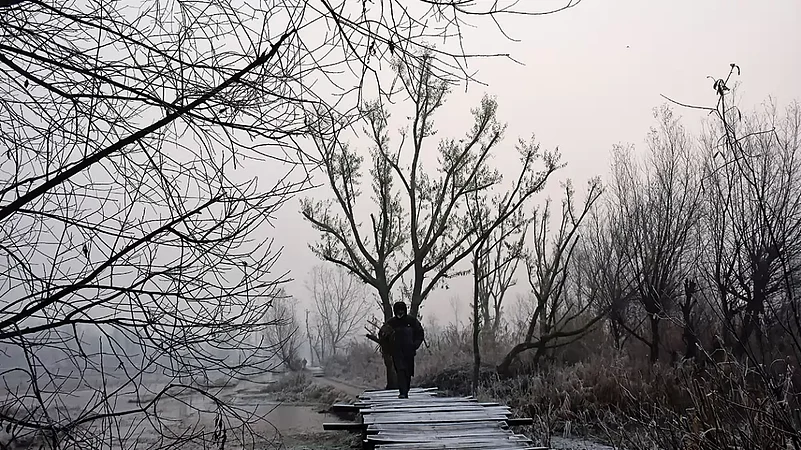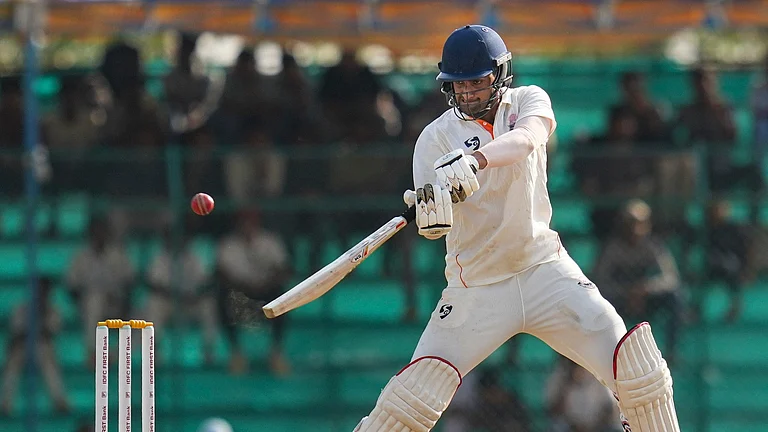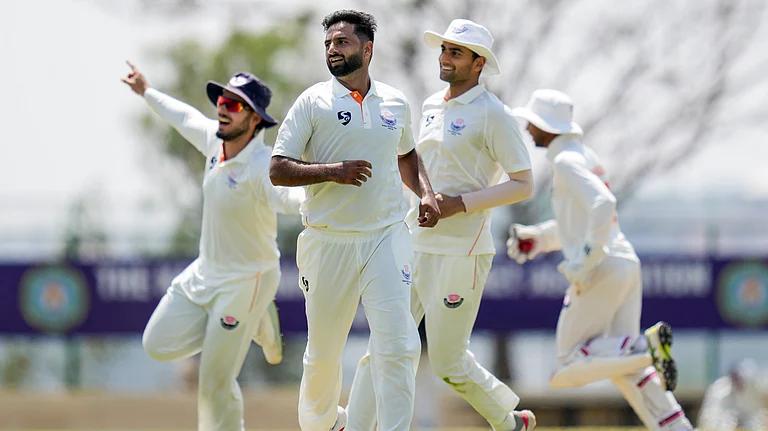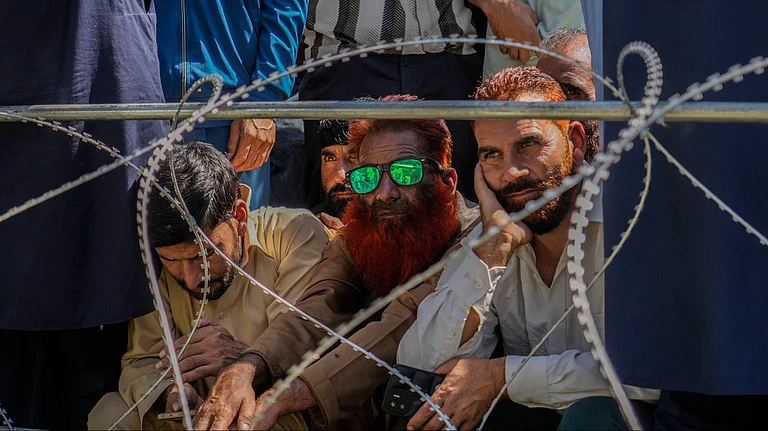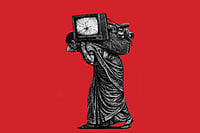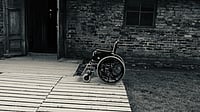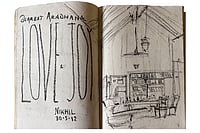Again I’ve returned to this country
where a minaret has been entombed.
Someone soaks the wicks of clay lamps
in mustard oil, each night climbs its steps
to read messages scratched on planets.
His fingerprints cancel bank stamps
in that archive for letters with doomed
addresses, each house buried or empty.
—from The Country Without a Post Office Agha Shahid Ali
“Where is the time? We are in the middle of the Ayodhya case hearing,” the CJI said on Monday. At the last hearing, he had raised hopes that at least the issue of alleged detention of minors in J&K would be addressed. However, he said that though the high court legal aid had submitted a report to the court he did not have the time to deal with it.
—from The Economic Times, September 30, 2019
On August 6, 2019, the Government of India revoked the special status, or autonomy, granted under Article 370 of the Indian Constitution to Jammu and Kashmir. A lockdown followed. Internet connection was cut off.
On the night of August 4, 2019, a man from the Valley asked me if I knew what was going on. My answer never reached him. The Valley had been plunged into a strange darkness that would continue for months.
Beyond the news about killings and detentions and protests, there was also everyday life, a new everyday “normal” was created again. There was also a resistance against forgetting. People wrote about small things and big things. On day one of what she referred to as the siege, a Kashmiri woman in Delhi wrote about her mother’s bones turning into powder due to acute osteoporosis and how she had to go for physiotherapy to build her muscles but with the lockdown in Kashmir, the daughter didn’t know how many sessions she would miss. The daughter wondered how many of her mother’s bones would be gone by the time the curfew and the clampdowns would be lifted. On day 4, the phones were not working still. The same woman wrote about there being no cinema halls in Kashmir and after she watched the movie Joker in Delhi, she wrote she wanted to scream. On day 7, she wrote the phone lines to Kashmir were still dead. They would be dead for a long time.
After 33 years, in September 2022, a multiplex was opened in Srinagar. Many outside of Kashmir touted this as a return to normalcy.
A long silence had been imposed. But people continued to speak during the curfew. Inside the mist that cut them off from us, they were there living and hoping and waiting.
What follows are some of those chronicles from that time about daily life in a lockdown.
----------*----------
I lost the journal, in which you wrote of how you cured the pain of memory,
when in August 2019, a siege was laid on all lovers.
You see, we die in concentric circles,
we died a little in history,
we died a little in conflict,
we died a little in caste and class,
we are dying a little every day and yet hope for a union, peace in a place, to which there is no roadmap.
We try hard making sense of the dust settled on the footprints of old lovers decimated on the way. Some lost senses, while in exile, trying to make sense of love trapped in the circle of history, some lost strength in the circle of conflict while some lost all meanings in the circle of life.
—Excerpts from On Losing a Diary of Clampdown by Sadaf Masoodi, a researcher at the University of Kashmir
----------*----------
It is unusually cold in October. My hands are freezing. Even with this down jacket I am wearing. You know when protests happen, it becomes colder. Like in 2016, October was very cold. Just like this. Because there are less cars on the road and not many tourists come and of course, everything is shut, pollution is less. So, it becomes colder. Funny, how curfew can affect weather. I think it is going to be very cold this winter.
----------*----------
They had just started building an attached bathroom, an extension to the bedroom the family had finished building to welcome the bride. But then the lockdown happened. So the father said they would build the bathroom themselves. They got the mortar and bricks and also, a pot. As they were carrying the pot upstairs, it fell from the father’s hand and he broke his hand just before the wedding. We don’t know if the bride came home. Or they are still waiting for the curfew to end. We don’t know if the bathroom was finally made for her welcome.
----------*----------
The man took three photos from the camera he borrowed. There were no wedding photographers in Srinagar to be found. His brother’s wedding was due. Perhaps 12-15 people could make it to the wedding during the curfew but a wedding needs photos. He saw a man with a camera and he wanted to ask if he could take the camera for a day. But he clicked only three photos. “Why?” the man who had given him the camera asked. “Because we took from phone. In this curfew, we took selfies. There will be no wedding album,” the man said.
----------*----------
Our Imam went missing a week after August 5. You know the story of the sobs on the loudspeakers of the mosque where the Imam cried over the loss of Mulk-e-Kashmir in South Kashmir at the Friday prayers. That Imam asked for God’s help and guidance.
An informal enquiry happened and a security officer forced the mosque’s administrative committee to request the Imam to leave. The Imam complied.
After that, there was an advisory where mosques were asked not to make any such anti-India statements. They started asking mosques to submit the names and ages and addresses of the Imams. A whole database was made but some mosques continued with their sermons on Fridays. Friday prayers were stopped at the Jamia Masjid in downtown where the congregation is a lakh people sometimes. And downtown people are different.
----------*----------
The bride-to-be woke up at 6 am. Woke up her mother sleeping next to her. “Hurry up,” she said. In this lockdown and curfewed state of being, the tailor will open at 6.30 am and close the store, she told her mother. Outside the tailor’s shop, a queue had formed as always. Some weddings were happening. Others had been cancelled. How would you even know if a wedding was on or cancelled? Phone lines had been down. Outside the parlours, the makeup artists had put up posters giving their residential addresses in case a bride needed to look beautiful.
----------*----------
During the lockdown, there are no barbers. Most had put up a sign saying they are available at their homes. So I went for a haircut and outside this little house, there were a lot of people there like there would be at a funeral. People were smoking in the little garden; they were standing in the alley; and in a small room, a dozen people were standing against the wall. In one corner, there was a little mirror and a plastic chair and this man was giving people haircuts. Now, this is Srinagar. People who love themselves and the way they look, had a tough time. They would have overgrown beards and then we would all smile at each other.
They would then touch their beards. There were a lot of beards in those days. Now, some barbers have opened shops in some neighbourhoods. But in rural Kashmir, it is different, I think. I once took a photo of an empty barber chair. Most of these barbers come from other states so maybe in South Kashmir and all people still have long beards and long hair. And in August when the lockdown happened, it used to be very hot. Getting a haircut or a beard trimmed was a task then in crowded areas where one man was at it and people were all lined up outside.
----------*----------
So, there was once a curfew and a child wanted sweets. His mother tried to tell him they couldn’t go out. The CRPF man outside heard the child pestering his mother, and told the child he will get him sweets. He picked him up, got him sweets, and thought it would ease the tension. Again, the question of identities. The occupier, and the occupied.
When he was dropping the child to his house, he asked him what else would he like. The child looked straight at him and said, “Azadi”.
(Everyday life conversations on the phone with a friend in Srinagar in October, 2019)
----------*----------
Me - How was the meeting? Did you meet
your brother?
Her - hi. we did, finally.
Got the permission from DGP later for
me and my brother.
Me - How was it?
Is he getting food?
Were there a lot of people there?
Her - 20 Kashmiris. They said they were being given
Rotis for lunch and dinner. So they all
protested and said they need rice. And now there’s rice in the menu. And the jailer said they’ve started to give them two eggs at breakfast.
Me - That’s nice. And were you able to talk to him? Did he know about Farooq Abdulla?
How much time did you get with him?
(WhatsApp chat with a friend on September 27, 2019. Her brother had been arrested in Kashmir in August and taken to the prison in Agra where she had gone to meet him.)
There was silence after this.
----------*----------
Today, I asked a poet who had written about “controlled mountains” in a poem if I could use a fragment, he said these things get out of context sometimes. That’s why there are no names but only the words in this recounting.
I remember the poem though. He had said it was a country where one rarely finds a way home. It was an invitation to come along to a country “occupied by death”. He had also written “Nobody speaks”.
(This appeared in the print as 'State Of The State')







